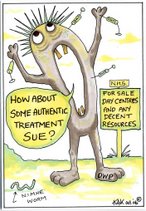
Whistleblowing Statistics And Why It Pays To Gag The User's Voice .
PCAW / Nursing Standard whistleblowing survey
Public Concern at Work
Suite 301
16 Baldwins Gardens
London EC1N 7RJ
Tel. 020 7404 6609
In response to the recent NHS nurse survey work by the whistleblowing charity Public Concern At Work (PCAW) UserWatch Speaks out about Birmingham And Solihull Mental Health NHS Trust :
In Birmingham and Solihull Mental Health Trust UK over years colleagues of UserWatch have noted how the "User Voice" organisation which was initially voluntary was hijacked by the Trust itself . The ambition of some of those working for User Voice was also to make a career from it and in 2002 onwards the quicker the better - they were ambitious....
It has never looked backwards although it has looked "sideways" many times on issues of real patient importance and now it has the support of the corporate Trust and a significant amount of staff .. Yet its well under control . Of the outgoing independent PPI (Patient Involvement Independent Forum abolished by Gov't in March 2008 ) the Chair of the Trust Peter Marquis had this to say in a Jan 2008 Board Meeting of their position towards the Trust in-house paid User Voice. The PPI recommended an Independent User Voice similar to Derby User Voice which is an independent Charity ..
"Public & Patient Involvement Forum - Formal Request for a joint study and implementation group leading to the creation of an independent Birmingham User’s Voice organisation Board Directors will have received copies of a paper from the PPIF regarding the above. The Trust has its own User Voice mechanism that is serving the Trust well.
Clearly with changes to the Local Involvement Networks (LINks) which will become active from September 2008, PPIF are concerned that this more generic model will loose the defined mental health user opinion in the future. In addition, PPIF have not been supportive of our in house model.
I have asked the Director of Strategic Management, who has the Public & Patient involvement portfolio to consider the ramifications of the PPIF paper. Clearly, as we have staff employed (including service users as field workers within our Directorates), I am not going to progress this proposal until the facts and risks of any change are clarified and debated. I have acknowledged receipt of their paper as required "
Staff and ex User Voice members have informed those allied to UserWatch that "whistleblowing" is too diffcult . There is a subtle but felt threat of intimidation by upper management who are keenly performance driven and there is gestural pressure to dilute the patient's voice.. So yes Peter - the User Voice does serve the Trust's performance politics well ...
It seems this theme of poor whistleblowing is reflected in a survey done on Nurses in the UK . Its a very mixed picture of results and there is strong evidence that if Nurses stand up for their patients they suffer negative consequences ...
We have heard of this in Birmingham in the mental health Trust too but Unison the Union is very right wing and god knows what its doing but it does play the bosses game of keeping the code of silence ......This is why some of the upper management are known as the "Staffia"
It has never looked backwards although it has looked "sideways" many times on issues of real patient importance and now it has the support of the corporate Trust and a significant amount of staff .. Yet its well under control . Of the outgoing independent PPI (Patient Involvement Independent Forum abolished by Gov't in March 2008 ) the Chair of the Trust Peter Marquis had this to say in a Jan 2008 Board Meeting of their position towards the Trust in-house paid User Voice. The PPI recommended an Independent User Voice similar to Derby User Voice which is an independent Charity ..
"Public & Patient Involvement Forum - Formal Request for a joint study and implementation group leading to the creation of an independent Birmingham User’s Voice organisation Board Directors will have received copies of a paper from the PPIF regarding the above. The Trust has its own User Voice mechanism that is serving the Trust well.
Clearly with changes to the Local Involvement Networks (LINks) which will become active from September 2008, PPIF are concerned that this more generic model will loose the defined mental health user opinion in the future. In addition, PPIF have not been supportive of our in house model.
I have asked the Director of Strategic Management, who has the Public & Patient involvement portfolio to consider the ramifications of the PPIF paper. Clearly, as we have staff employed (including service users as field workers within our Directorates), I am not going to progress this proposal until the facts and risks of any change are clarified and debated. I have acknowledged receipt of their paper as required "
Staff and ex User Voice members have informed those allied to UserWatch that "whistleblowing" is too diffcult . There is a subtle but felt threat of intimidation by upper management who are keenly performance driven and there is gestural pressure to dilute the patient's voice.. So yes Peter - the User Voice does serve the Trust's performance politics well ...
It seems this theme of poor whistleblowing is reflected in a survey done on Nurses in the UK . Its a very mixed picture of results and there is strong evidence that if Nurses stand up for their patients they suffer negative consequences ...
We have heard of this in Birmingham in the mental health Trust too but Unison the Union is very right wing and god knows what its doing but it does play the bosses game of keeping the code of silence ......This is why some of the upper management are known as the "Staffia"
Have a look at the survey figures into Whistleblowing below from PCAW
PCAW / Nursing Standard whistleblowing survey
Public Concern at Work
Suite 301
16 Baldwins Gardens
London EC1N 7RJ
Tel. 020 7404 6609
Percents
Absolute
Q1 In the past three years, have you had a concern about a serious risk to patient safety?
Yes
513
68.2%
No
239
31.8%
Q2 If yes, did you raise the concern?
Yes
445
86.7%
No
68
13.3%
Q3 Who did you raise your concern with?
Line manager
190
42.7%
Team leader
78
17.5%
Senior Management
91
20.4%
Union
10
2.2%
Regulator / Department of Health
5
1.1%
Patient or Patients Family
3
0.7%
Media
0
0.0%
Multiple
68
15.3%
Q4 How do you think the risk to patient safety was handled? Well – the patient safety issue was properly addressed or resolved
128
28.8%
Fairly – the patient safety issue was fairly considered but I did not agree with the outcome
89
20.0%
Badly – the patient safety issue was ignored, covered up or not addressed
210
47.2%
Don’t know
18
4.0%
Q5 Did you personally suffer any serious or lasting negative professional consequences?
Yes
170
38.2%
No
275
61.8%
Q6 Did the serious risk you identified eventually cause harm to patients?
Yes
23.2%
119
No
45.2%
232
Don't know
31.6%
162
Q7 If next week you were to have a concern about a serious risk to patient safety would you raise it?
Yes
85.1%
640
No
5.1%
38
Don't know
9.8%
74
Q8. Which three factors would you say most deter nurses from raising a concern about patient safety?
It is just a suspicion
22.1%
166
"I'm only a nurse"
11.2%
84
Someone else will raise it
19.7%
148
Not wanting to get colleagues) into trouble
49.6%
373
Fear of being seen as a "snitch" by colleagues
47.6%
358
Fear of dismissal or discipline
45.7%
344
Nothing will be done anyway
57.6%
433
Not knowing who to talk to
21.9%
165
It doesn't feel safe
24.6%
185
Q9. Would you say your employer does enough to promote whistleblowing?
Yes
21.1%
159
No
59.7%
449
Don't know
19.1%
144
Q10 Has your organisation used its whistleblowing arrangements to discourage staff from raising a concern?
Yes
16.9%
127
No
30.1%
226
Don't know
53.1%
399
Q11 Has a colleague in your organisation used whistleblowing to protect their own position or pursue a private agenda?
Yes
20.3%
153
No
21.0%
158
Don't know
58.6%
441
Q12 If you raised a concern about patient safety and suffered reprisals from your manager or team, how confident are you your organisation would try to remedy the situation?
Very Confident
50.9%
44
Quite Confident
23.3%
175
Not V. Confident
30.9%
232
Not at all Confident
245
32.6%
Don't know
56
7.4%
Q13 Compared to three years ago, how would you describe the culture for raising concerns in your workplace?
Much better
88
11.7%
Slightly better
174
23.1%
About the same
316
42.0%
Worse
108
14.4%
Much worse
66
8.8%
Q14 How would you describe your organisation's relationship with its staff? Very open
36
4.8%
Open
253
33.6%
Not very open
334
44.4%
Closed
129
17.2%
Q15 How would you describe your organisation's relationship with the public?
Very open
46
61.0%
Open
324
43.1%
Not very open
316
42.0%
Closed
66
8.8%
LINKS : PCAW NEWS

.jpg)







No comments:
Post a Comment